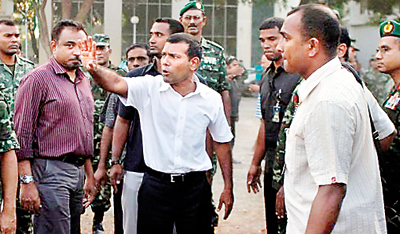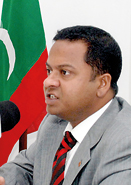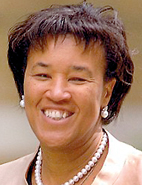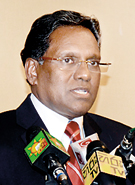Columns
Sri Lankan legal experts say Nasheed resigned under duress
A team of Sri Lankan lawyers has produced a scathing critique of the Report of the Maldivian Commission of National Inquiry (CoNI), which claimed that the ousting of former Maldivian president Mohamed Nasheed was ‘not a coup.’
The Legal Review of the Maldivian report by President’s Counsel and former Attorney General Shibly Aziz and Attorneys-at-Law Anita Perera and Senany Dayaratne concludes that there is enough evidence to suggest that Nasheed resigned under duress, and not of his own free will. It said the CoNI report “doesn’t appear to fully consider” the laws relevant to the concept of duress, nor the provisions relating to coups. The failure to objectively consider whether there was an element of duress in Nasheed’s resignation vitiates the validity of the report, it argues.

Mohamed Nasheed attempts to address protesting policemen, before announcing his resignation in capital Male during the political crisis in February.
The Legal Review by the Sri Lankan team was commissioned by Nasheed’s party the Maldivian Democratic Party (MDP). The authors emphasise that though the MDP is a party to the events in question, the document is the result of an “objective scrutiny of the contents of the Report and attendant documents alone,” and that they have “eschewed partisan inclinations or predispositions.”
The 38-page critique points to a series of flaws in matters such as compliance of the mandate given to CoNI, procedure adopted in the exercise of its mandate, procedure of evidence gathering, adherence to the imperative dictates of natural justice and consequential legal issues. CoNI’s mandate was to investigate the legality of the change of government on 7th February 2012 and whether the resignation of then president Mohamed Nasheed was obtained under duress. But CoNI sought to offer political justification for the power transfer, rather than analysing its legality, the authors say.
With regard to the events of Feb 8 when the MDP came under attack, the Review says CoNI only acknowledges that there were acts of police brutality that need further investigation, but “fails to consider the significance of such events in illustrating the context of unlawful pressures under which the resignation of president Nasheed was elicited just a day before.” By concluding that the events of Feb. 6 and 7 were ‘reactions’ to the actions of Nasheed, CoNI seems to condone them, and suggest that Nasheed deserved what he got. Such conclusions are “tainted with manifest bias” and “exceed the mandate granted,” the Review says.
It points out that CoNI considers the legal principle of ‘coercion’ instead of ‘duress.’ “The term ‘coercion’ is considered in the light of threat to life, limb or liberty, whereas ‘duress’ has a much broader scope and “includes all facts and circumstances that vitiates the consent of a person and denies voluntariness.”
The Review draws attention to Nasheed’s chilling narrative of events of Feb. 7 during a five-hour statement to CoNI. The Review says there were “repeated references to President Nasheed’s detractors being in possession of weapons, or being overtly menacing in word or deed.”
” ‘… At this instant the cries of “bring the ropes to hang him” and to “bring the ropes to tie him” became louder and more threatening. I then asked MNDF to take me back to Muleeaage, but they refused to take me there or anywhere else. I wanted to see if I could leave the building but the Special Protection Group (SPG) of MNDF who was guarding me refused to take me anywhere and in fact when I attempted to leave, they at one instance physically held me. They insisted that I stay in MNDF, even though they did not protect the building from mutinying officers. It was then very obvious to me that there was no way out for me, but to die or do their bidding…’(emphasis added)”
Observing that it is curious why very little weight is given to Nasheed’s statement, the Review submits that “the foregoing, amongst other evidentiary support, gives strong credence to the claim that President Nasheed was under duress when he tendered his resignation.”
It further alleges that Nasheed’s right to a ‘fair hearing’ was disregarded, in that he had “not been given the opportunity to see and/or refute and/or challenge adverse material …”
The Review dismisses CoNI’s argument that, since the Vice President who took over as President contested on the same ballot as Nasheed, a coup could not have taken place. It contends that this argument seeks to justify the change of power in terms of what happened three years ago and does not consider the context in which the transition in fact took place on 7th Feb.
The document also points to glaring omissions in the CoNI Report. For instance it says on 23rd Jan. 2012, Umar Naseer, the Deputy Leader of the Progressive Party of Maldives (PPM) publicly called to revolt and siege of the Maldives National Defence Force (MNDF) headquarters.
“Also, in a PPM rally on 12th Feb 2012, Umar Naseer publicly proclaimed his role in the coup.” Umar Naseer’s role and public statements are nowhere mentioned in the Report according to the Review. It says leaders of the Opposition DQP Dr Hassan Sayeed and Dr Mohamed Jameel Ahmed, and PPM MP Ahmed Mahloof, all have “in different instances publicly stated that the events of 7th Feb 2012 was a coup.” The Report makes no mention of their statements.
The initial draft of the CoNI report prepared by the Co-Chair was presented on the 25th Aug. 2012, just five days before the Report’s release. The Review says some of the key witnesses were called only on the 26th and 27th. On 29th Aug, one of the commissioners resigned citing various irregularities, including non examination of witness statements, audios, video footage and photos.
The Review lists names of key personnel in the police and military whose statements were not taken by the reconstituted CoNI, others whose statements were taken only on the 27th Aug. and still others whose statements were not taken at all. It said CoNI has not considered at all the account given by Nasheed’s spouse, Laila Ali. Referring to the mutiny by sections of the police and armed forces the Review observes that “inability of the President to control his army, is one of the universally accepted hallmarks of a coup and further corroborates the incidence of duress …”
The Legal Review of the CoNI Report by the Sri Lankan lawyers would seem to suggest that the crisis in the Maldives is far from over. The many revelations in this critique leave one at a loss to figure on what basis the UN and Commonwealth hastened to rubberstamp the CoNI Report.
Follow @timesonlinelk
comments powered by Disqus
























